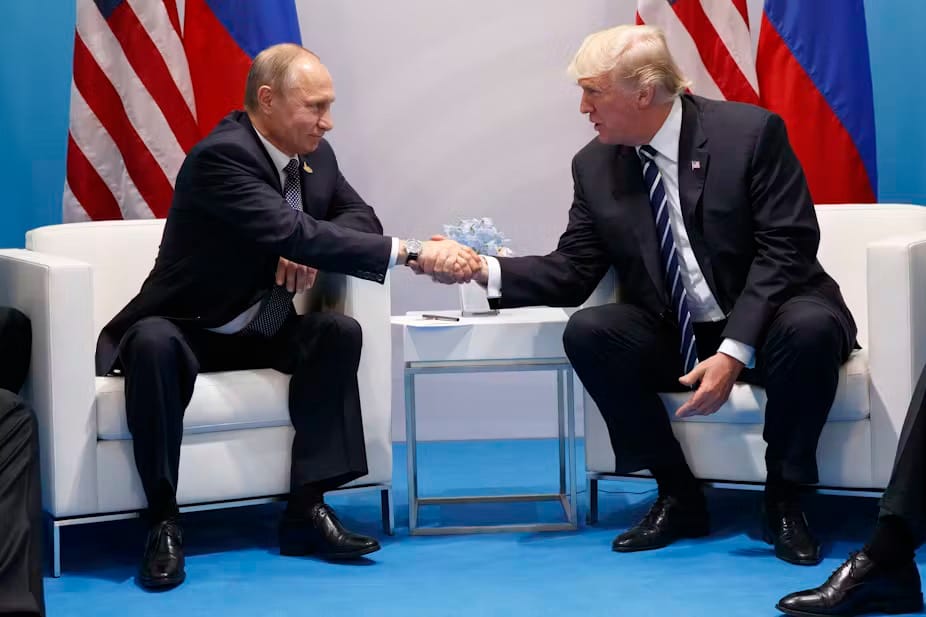March 7 2025
Trump’s Antitrust Pick Unites; Trump Clips Musk’s Wings; Newsom shifts on trans; Walgreens falls; U.S.-Russia realignment shakes Eurasia

Trump’s Antitrust Pick Unites Left and Right Against Big Tech
Trump Clips Musk’s Wings, As He Shifts Federal Workforce Cuts to Cabinet
Newsom Breaks with Democrats, Calls Transgender Sports Rules Unfair
Walgreens Sold for $10 Billion After Decade of Decline
Battle for Eurasia Update: Geopolitical Earthquake As US Aligns With Russia, Pivots To Asia
GET THE CITIZEN JOURNAL APP - FREE!
1. Trump’s Antitrust Pick Unites Left and Right Against Big Tech
Among the loyalists selected by Donald Trump to staff his second administration, Gail Slater stands out for a different reason: she unites right and left with a sceptical view of big business. While the US president’s other nominees tend to be traditional conservative free market advocates, Slater, his pick to lead the Justice Department’s antitrust division, is expected to maintain the Biden administration’s vigorous approach to enforcement — much to Wall Street’s chagrin. In public remarks and written submissions to lawmakers, the 53-year-old Oxford graduate has expressed concern about market concentration and said enforcement should be focused on technology and sectors with a direct impact on Americans’ pocketbooks. Slater embodies the unlikely alignment of progressives who support tough antitrust enforcement and a new generation of populist conservatives helmed by vice-president JD Vance, who has called for the break-up of Google.
My take: Taking a Blow Torch to Big Tech
Source: FT
2. Trump Clips Musk’s Wings, As He Shifts Federal Workforce Cuts to Cabinet
President Donald Trump directed Cabinet members Thursday to be more involved in deciding which government workers are shed, rather than waiting for directives from Elon Musk, a subtle but important shift in the overhaul of the federal workforce that he and his billionaire adviser have championed. Trump held the Cabinet meeting after weeks of growing tensions between his top political officials, who sometimes had little or no foreknowledge of U.S. DOGE Service’s actions, and Musk, who has touted his powers to make sweeping cuts across the government. The president emerged saying he wanted his Cabinet members to “go first,” keeping those they deemed effective at their jobs and firing others, while warning that Musk still held significant authority.
Source: Washington Post
3. Newsom Breaks with Democrats, Calls Transgender Sports Rules Unfair
Gov. Gavin Newsom of California, embarking on a personal post-mortem of the failures of his Democratic Party, suggested this week that the participation of transgender athletes in women’s sports was “deeply unfair.” The comments by Mr. Newsom, who has backed L.G.B.T.Q. causes for decades and was one of the first American elected officials to officiate same-sex weddings, represented a remarkable break from other top Democrats on the issue, and signaled a newly defensive position on transgender rights among many in his party. Just as surprising as Mr. Newsom’s remarks was the person to whom he made them: Charlie Kirk, a 31-year-old right-wing influencer best known for starting Turning Point USA, the pro-Trump organization that is active on college campuses. Mr. Newsom invited Mr. Kirk, who has a history of inflammatory and conspiratorial remarks, onto the debut episode of his new podcast, “This Is Gavin Newsom,” for an 81-minute discussion. The governor, who has long been fascinated with the conservative media ecosystem and tried to inject himself into it, explained his unlikely guest by saying, “People need to understand your success, your influence, what you’ve been up to.”
Source: NYT
4. Walgreens Sold for $10 Billion After Decade of Decline
Not much has gone right for Walgreens in the past decade. Customers bought more and more household items online at sites such as Amazon.com, instead of Walgreens’s more than 8,000 stores across the U.S. The pharmacy chain inked deals with other drug suppliers and doctors offices, but stood pat while rivals, including CVS and Express Scripts, merged with big health insurers, gaining control of the medical-reimbursement purse strings that were squeezing pharmacies. Walgreens cash flow sagged, its debt piled up and shares sank. And on Thursday, Walgreens was sold to private-equity firm Sycamore for $10 billion, down a staggering 91% from its $106 billion peak in 2015. The storied pharmacy chain—which became a ubiquitous seller of everything from diabetes injections to nail files as retailers consolidated across the U.S.—fell after it neglected to keep up with customer preference to buy online and failed to navigate the fierce competition and intense cost pressures of healthcare.
Source: WSJ
5. Battle for Eurasia Update: Geopolitical Earthquake As US Aligns With Russia, Pivots To Asia
Editors note: This ongoing conflict pits the West, led by the United States, against an axis of adversaries, including China, Russia, Iran, and North Korea. At stake is dominance over the vast and strategically critical landmass of Eurasia. The conflicts in Ukraine, the Middle East, and rising tensions with China in East Asia are all interconnected, forming part of a larger struggle: the Battle for Eurasia. To dive deeper into my framework for understanding the Battle for Eurasia, see my article.
A. Ukraine is to begin negotiations with the US next week over ending the war set off by Russia’s 2022 invasion, after days of tension between Kyiv and Washington. Volodymyr Zelenskyy confirmed the talks as he wrapped up a summit on Thursday with EU leaders, who rallied round the Ukrainian president and pledged to increase their own defence capabilities. “The war must be stopped as soon as possible, and Ukraine is ready to work 24/7 together with partners in America and Europe for peace,” Zelenskyy said in a post on Telegram after the Brussels summit. “Next week, on Monday, I am scheduled to visit Saudi Arabia to meet with the Crown Prince [Mohammed bin Salman]. After that, my team will remain in Saudi Arabia to work with American partners. Ukraine is most interested in peace.” News of the meeting followed a week in which Zelenskyy clashed with US President Donald Trump at the White House and the US suspended military aid and intelligence support to Kyiv. The Trump administration has previously held bilateral talks with Russia, excluding Ukraine and other European states. Trump’s special envoy, Steve Witkoff, said the meeting with Ukraine would seek to agree a framework for “a peace agreement and an initial ceasefire”. The talks will be focused on the minerals deal that the US has struck with Ukraine as well as a possible ceasefire.
Source: FT
B. Late Tuesday, the leaderships of Germany’s traditional two dominant parties, the Social Democrats and Christian Democrats, announced their intention to borrow €900 billion, to be spent on two funds covering defense and infrastructure. To do this, they will amend the constitution in the two weeks before the next legislature is convened. After decades of defiantly running a tightly conservative fiscal ship, this is a sudden “whatever it takes” moment. For European economics, the change is almost as radical as the US shift to support Russia rather than Ukraine. It’s also, of course, linked to that shift. Faced with a crisis imposed on them by the US, Germany’s governing elite has made a move that it had been resisting for decades. Quantitatively, we can gauge what an asteroid collision this is from the market reaction. The most consequential was in the 10-year bund yield, which rose 30 basis points for its biggest one-day rise since Germany reunified in 1990
Source: Bloomberg
C. A former spy and close friend of Vladimir Putin has been engineering a restart of Russia’s Nord Stream 2 gas pipeline to Europe with the backing of US investors, a once unthinkable move that shows the breadth of Donald Trump’s rapprochement with Moscow.
Source: FT
D. Russia agreed to assist US President Donald Trump’s administration in communicating with Iran on issues including the Islamic Republic’s nuclear program and its support for regional anti-US proxies, according to people familiar with the situation.
Source: Bloomberg
Editors note: A seismic shift is underway as the United States realigns its geopolitical stance toward Russia, historically its adversary for most of the last 80 years. In the emerging multipolar world order, three dominant powers—the U.S., Russia, and China—are reshaping global dynamics. With America increasingly pivoting toward Asia, heightened tensions between the U.S. and China are likely to intensify. Meanwhile, the U.S. is pulling back from Europe after dominating the continent since World War II, leaving Europe to face stagnation, decline, and the necessity of forging its own strategic relationship with Russia.
March 7, 1876: Alexander Graham Bell patents the telephone
SUBSCRIBE ONLINE TO GET THE US CITIZEN JOURNAL IN YOR INBOX - FREE!
See the Ad Astra Podcast! Released on Apple and Spotify around 10a CST.
Sponsors (click me!)










Sources
- https://www.ft.com/content/769709d5-f897-497d-a8f2-ce15a3c977ed
- https://www.washingtonpost.com/politics/2025/03/06/trump-musk-cabinet-federal-worker-cuts/
- https://www.nytimes.com/2025/03/06/us/politics/gavin-newsom-transgender-sports-democrats.html?searchResultPosition=1
- https://www.wsj.com/business/retail/walgreens-private-equity-sale-rise-fall-42ac5db6?mod=hp_lead_pos8
- https://www.ft.com/content/42682d64-68a3-46c6-a543-6425be2142fd
- https://www.bloomberg.com/opinion/articles/2025-03-06/germany-s-vance-shock-turns-to-anger-and-animal-spirits
- https://on.ft.com/3Df6mZ2
- https://www.bloomberg.com/news/articles/2025-03-04/iran-putin-to-help-trump-broker-nuclear-talks-with-tehran?srnd=homepage-americas
